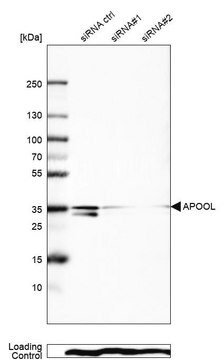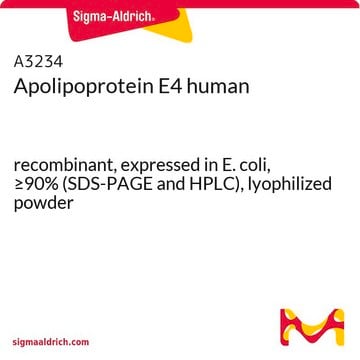General description
We are committed to bringing you greener alternative products, which adhere to one or more of The 12 Principles of Green Chemistry. This antibody is Preservative-free, produced without the harm or sacrifice of animals and exceptionally stable to allow for ambient shipping and storage if needed and thus aligns with "Waste Prevention", "Designing Safer Chemicals" and "Design for Energy Efficiency".
Click here for more information.
ZooMAb® antibodies represent an entirely new generation of recombinant monoclonal antibodies. Each ZooMAb® antibody is manufactured using our proprietary recombinant expression system, purified to homogeneity, and precisely dispensed to produce robust and highly reproducible lot-to-lot consistency. Only top-performing clones are released for use by researchers. Each antibody is validated for high specificity and affinity across multiple applications, including its most commonly used application. ZooMAb® antibodies are reliably available and ready to ship when you need them.
Specificity
Clone 1G19 is a ZooMAb® rabbit recombinant monoclonal antibody that specifically detects Mitfilin. It targets an epitope within 20 amino acids from the N-terminal half.
Immunogen
KLH-conjugated linear peptide corresponding to 20 amino acids from the N-terminal half of human Mitofilin.
Application
Quality Control Testing
Evaluated by Western Blotting in Raji cell lysate.
Western Blotting Analysis: A 1:1,000 dilution of this antibody detected Mitofilin in Raji cell lysate.
Tested Applications
Western Blotting Analysis: A 1:1,000 and 1:10,000 dilution from a representative lot detected Mitofilin in Rat brain and Mouse brain tissue lysates, respectively. .
Affinity Binding Assay:: A representative lot of this antibody bound Mitofilin peptide with a KD of 3.0 x 10-7 in an affinity binding assay.
Immunohistochemistry (Paraffin) Analysis: A 1:100 dilution from a representative lot detected Mitofilin in Human heart tissue sections.
Immunocytochemistry Analysis: A 1:100 dilution from a representative lot detected Mitofilin in A431, HeLa, HepG2, and NIH 3T3 cells.
Note: Actual optimal working dilutions must be determined by end user as specimens, and experimental conditions may vary with the end user.
Target description
MICOS complex subunit MIC60 (UniProt: Q16891; also known as Cell proliferation-inducing gene 4/52 protein, Mitochondrial inner membrane protein, Mitofilin, p87/89) is encoded by the IMMT (also known as HMP, MIC60, MINOS2, PIG4, PIG52) gene (Gene ID: 10989) in human. Mitofilin is a single-pass membrane protein that is synthesized with a transit peptide (1-33), which is subsequently cleave off. It is localized in the mitochondrial inner membrane and contains a mitochondrial matrix domain (aa 25-64), a transmembrane domain (aa 46-64), and a mitochondrial intermembrane domain (aa 65-758). Mitofilin is enriched in the narrow space between the inner boundary and the outer membranes, where it forms a homotypic interaction and assembles into a large multimeric protein complex. It is a component of the mitochondrial contact site and cristae organizing system (MICOS) complex that is composed of several other proteins, including MICOS10, MIC19, MC25, MIC27, MIC60, MIC23, MIC13. The MICOS complex associates with mitochondrial outer membrane proteins SAMM50, MTX1 and MTX2 that are components of the mitochondrial outer membrane sorting assembly machinery (SAM) complex. Mitofilin plays crucial roles in the maintenance of crista junctions, inner membrane architecture, and formation of contact sites to the outer membrane. It has an important role in the maintenance of the MICOS complex stability and the mitochondrial cristae morphology. Down-regulation of mitofilin in HeLa cells is shown to reduce cell proliferation and increase apoptosis. Knockdown of mitofilin leads to mitochondrial swelling and damage of cristae that is associated with the increase in reactive oxygen species (ROS) production and mitochondrial calpain activity, and a reduction in intracellular ATP production and mitochondrial membrane potential. This ZooMAb® recombinant monoclonal antibody, generated by our propriety technology, offers significantly enhanced specificity, affinity, reproducibility, and stability over conventional monoclonals. (Ref.: Madungwe, NB., et al. (2018). Am. J. Physiol. 315(1); C28-C43; Ott, C., et al. (2015). PLos One. 10(3); e0120213; Alkhaja, AK., et al. (2012). Mol. Cell Biol. 23(2); 247-257; John, GB., et al. (2005). Mol. Cell Biol. 16(3); 1543-1554).
Physical form
Purified recombinant rabbit monoclonal antibody IgG, lyophilized in PBS, 5% Trehalose, normal appearance a coarse or translucent resin. The PBS/trehalose components in the ZooMAb formulation can have the appearance of a semi-solid (bead like gel) after lyophilization. This is a normal phenomenon. Please follow the recommended reconstitution procedure in the data sheet to dissolve the semi-solid, bead-like, gel-appearing material. The resulting antibody solution is completely stable and functional as proven by full functional testing. Contains no biocide or preservatives, such as azide, or any animal by-products. Larger pack sizes provided as multiples of 25 µL.
Reconstitution
0.3 mg/mL after reconstitution at 25 µL per vial. Please refer to guidance on suggested starting dilutions and/or titers per application and sample type.
Storage and Stability
Recommend storage of lyophilized product at 2-8°C; Before reconstitution, micro-centrifuge vials briefly to spin down material to bottom of the vial; Reconstitute each vial by adding 25 µL of filtered lab grade water or PBS; Reconstituted antibodies can be stored at 2-8°C, or -20°C for long term storage. Avoid repeated freeze-thaws.
Other Notes
Concentration: Please refer to the Certificate of Analysis for the lot-specific concentration.
Legal Information
ZooMAb is a registered trademark of Merck KGaA, Darmstadt, Germany
Disclaimer
Unless otherwise stated in our catalog or other company documentation accompanying the product(s), our products are intended for research use only and are not to be used for any other purpose, which includes but is not limited to, unauthorized commercial uses, in vitro diagnostic uses, ex vivo or in vivo therapeutic uses or any type of consumption or application to humans or animals.









